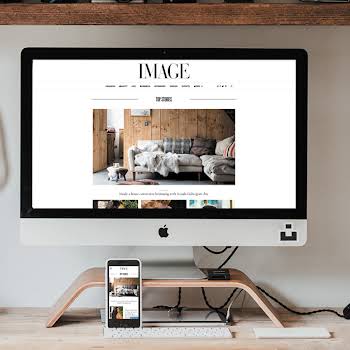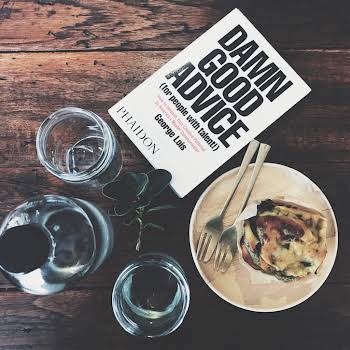
By Erin Lindsay
05th Nov 2018
05th Nov 2018
Women are making their mark in the world of business like never before. In every industry and at every level, we look to women who’ve made it their own as an example for us to do the same. For our series ‘Love Your Work‘, we ask women who have achieved stunning success in their career to tell us how they got there, and their advice on how we can join them.
Laura Garvey was not always a Solutions Consulting Manager at Sprinklr – she began her professional life in the fashion industry, styling and later working at The Outnet. When the opportunity came up to switch to the tech industry, it was her flexibility that led her to her favourite role. In this week’s Love Your Work, we chat communication, being entrepreneurial and making the big switch.
What was your favourite subject in school?
English was always my favourite. My dad was an English teacher and my mum was a librarian, so books and stories were always a big part of how I grew up and how my family communicated. I remember going on holidays to Wexford as a kid and being given five pounds to go to this lovely little bookshop on the high street, and I would disappear into it for hours, delighted with being able to search out books. I could always relate to authors and how they told a story – it’s similar to music, when a note hits you and resonates with you, I had that with certain phrases or quotes from a story, and always found it powerful.
What was your first job, and what other jobs have you had since?
My first part-time job was a waitress at the Ryder Cup for four days – it wasn’t really a real job! I then worked as a retail assistant in H&M and Urban Outfitters throughout college, and after that, I started working part-time for Totally Dublin as an intern. I also worked as a stylist assistant for Aisling Farinella and did some freelance styling myself, all while I was in college. I just loved that world of fashion, working with photographers on shoots, doing storyboards, meeting models, all of it.
I guess my first real job was when I moved to Sydney and worked as an intern/ beauty assistant in Harper’s Bazaar Australia. I absolutely loved it, and I learned so much about the publishing industry, how different departments worked together, how advertising came into the business, and it lead to my next career progression, which was as a sub-editor of The Outnet, which is part of the Net-a-Porter group.
After that, a friend of mine who worked there started working as a social media manager, and she was working with a social media management platform called Sprinklr, and her success manager convinced her to join. She then sent me a role called ‘Solutions Consultant’ – I had no idea what that even was, but I decided to go for it anyway! It was an odd turnaround to work for a tech company, but I got along so well with it, that I didn’t look back.
What does your daily routine look like?
I don’t really have one! You read a lot about ‘habits of highly successful people’, and I would love to have a stringent morning routine, but my job is just too varied. I travel a lot with my role – I could be in the U.S, the U.K, Europe – just this year, I met with my product development team in India. There can be a lot of planning and strategising between teams, or I could be actually meeting with customers, and helping them plan how their social media strategy can best benefit them.
What’s your favourite part of the job?
I absolutely love working with customers. I studied journalism and French, and strangely, as a consultant, that specific ability to question people and find out information from them is very useful. To find out what they need from their strategy and their goals, and translate that into a workable plan, is very rewarding. I love the fact that I get to work with incredibly talented and hardworking men and women in this role.
What’s your least favourite part?
I suppose the long hours are sometimes my least favourite part, but there’s nothing particularly bad about it. It comes in waves, where sometimes I could have a few tough weeks, but it’s nothing too bad.
What are the key skills you need to make it in your industry?
You need to be entrepreneurial – you need to be able to run your own schedule, and your own business in a sense. A solutions consultant partners with sales teams to showcase what our product looks like, and how we can deliver it. Consultants need partner with sales teams, with customer success teams, with product management and development teams to build a whole picture. You need to work with a team, but also be independent. Having internal drive is a big thing.
What are the most important lessons you’ve learned for success in your career?
There’s a lot of people out there who talk about how important mentorship is, and I really believe that. At the beginning of my career, I didn’t grasp what a mentor meant, and how I could find someone like that for me. It really is about building relationships and speaking with people you admire and who have a good attitude or ability for the job, and asking them to spend a bit of time with you so you can learn with them. You can bounce ideas off them and they can help to guide you in the right direction.
Any regrets?
I don’t think I have a regret – it’s cheesy, but every decision you make ultimately leads you to where you’re at now, and I love the role I’m currently in. If I had a regret, it might be the fact that I was a bit inflexible in viewing my career. I loved fashion so much and believed that I wanted to stay in that industry for life – until I found this role. That flexibility was so important in making the jump to a new industry – even though there was some similarities between the roles, like being creative and questioning, letting go of feeling stuck to a certain path and being flexible was something I wish I’d learned a bit earlier.
What do you wish you knew when you were starting your career?
It’s a really easy thing to say, but not so easy to do – don’t compare yourself to others. Look at people you admire and the attributes they have, and then look at how they align with your goals and where you want to go. Think about what you love, and what you’re good at, and how they line up together. I think if you compare yourselves to others, you’re playing a losing game, because they will have different strengths and goals to you.
What’s the number one piece of advice you would give to young people starting out who want to follow in your footsteps?
You’ll hear that the number one thing you should be focusing on is ‘interning, interning, interning’. And that is really important, but exposing yourself to different industries, and trying plenty of different roles and being flexible to everything is equally as important. Don’t be too judgemental about career paths – you might have preconceived notions about a career that won’t be true at all. It’s easier than you think to change the path you’re on – you can always change, and you can always grow.























